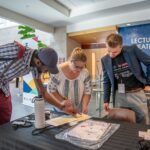The World Health Organisation estimates that one in every ten medical products sold in Africa is substandard.
In Nigeria, adulterated products persist both in medications and food, contributing to hundreds of thousands of preventable deaths annually.
Recently, the National Agency for Food and Drug Administration and Control, or NAFDAC, botched over 80 containers filled with counterfeit drugs and food products in Lagos.
A month earlier, the agency sealed an array of supermarkets and cosmetics shops in Abuja for selling unregistered beauty products worth over ₦170 million.
Its latest coup is the outcome of a partnership with national organisations such as the Nigeria Customs Service, which has ratcheted up surveillance on the import of fake drugs into the country.
Similarly, NAFDAC is collaborating with security agencies like the police and military to secure its enforcement officers and sustain regular raids on high-risk markets.
Strengthening inspection
The agency has adopted a slew of innovative methods to strengthen border surveillance and root out illicit marketers through digital tracking systems, apart from involving the market associations in the initiative of enhancing voluntary compliance.
Central to this campaign against counterfeit products is reviving consumer trust. Consequently, the agency’s Mobile Authentication Service enables Nigerians to verify the validity of medications through SMS scratch code digits.
In the same vein, the Greenbook app ensures that basic information such as the brand name and the registration status of the product can be promptly confirmed.
With a combination of enforcement activities and consumer education, the agency intends to reduce the prevalence of counterfeit products as well as unsafe food in Nigeria.
A global battle against fake drugs
Across the world, the war against counterfeit products is ramping up.
Operation Pangea, an Interpol-coordinated initiative, brings together regulatory and customs authorities to dismantle illicit online pharmacies and intercept the shipment of fake medicines across borders.
Joint surveillance campaigns by health and security organisations are targeting fake malaria medicines in West Africa. Along with border inspections, intelligence-led investigations are helping to disintegrate regional trade in counterfeit drugs.
The success of these interventions is thanks in part to collaboration and regional coordination.
Despite the progress, the absence of local drug production capabilities continues to fuel the importation of substandard drugs.
Also, the illicit drugs market has evolved. There have been attacks on officials from NAFDAC at the Lagos Trade Fair Market, showing increased resistance from the illicit traders. This latest operation by NAFDAC shows a new direction towards preventive regulation.
If progress must be lasting, there will be a need for tougher legislation and more local drug production, as well as continued cooperation between authorities and the public in making sure that only safe and authentic products gain entry into the country’s shores.
Summary not available at this time.






